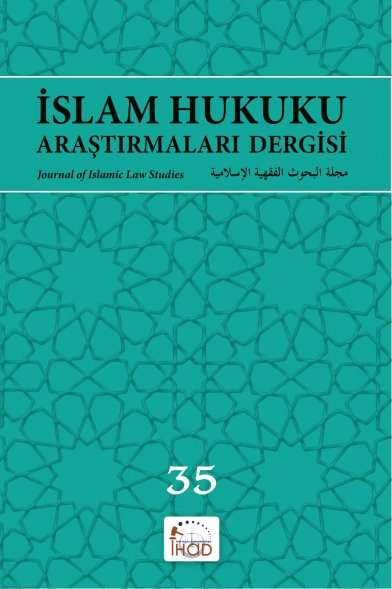İslâm Hukuku Açısından Mirasçılar Lehine Yapılan Vasiyetler
Bir mal veya menfaati ölümden sonraya bağlı olmak üzere karşılıksız olarak bir şahsa veya hayır cihetine temlik etmek olarak ifade edilen vasiyet hukuki bir işlemdir. Vasiyetin meşruluğunu kabul eden hukuk sistemleri, fertlerin haklarını ve toplum düzenini korumak maksadıyla vasiyet hakkının kullanımıyla ilgili birtakım düzenlemeler yapmışlardır. İslâm hukukunda da kişinin vasiyet hakkını kullanması noktasında bazı düzenlemeler yapıldığı görülmektedir. Vârise vasiyet yapılmaması bunlardan biridir. Ancak genel kanının aksine bu konuda mezhepler arasında tam bir ittifak olmadığı gibi İslâm ülkelerinde yapılan kanunlaştırmalardaki farklılıklar da dikkat çekmektedir. Bu görüş farklılıklarının sebepleri temel olarak nasslar ve nassların yorumudur. Kur’an ana-baba özelinde vârise vasiyeti caiz hatta zorunlu görürken; sünnette vârisler lehine vasiyette bulunmayı yasaklayan hükümler yer almaktadır. Bu durumu çözmek isteyen İslâm hukukçularından bazıları sünnetin sahih olmadığını, bu sebeple vasiyet âyetinin muhkem olarak hükmünü koruduğunu iddia ederken; karşı tarafta yer alanlar âyetin neshedildiğini ifade etmişlerdir. Ancak vasiyet ayetini nesheden delilin sünnet mi yoksa miras âyetleri mi olduğu noktasında bir ittifaktan söz etmek mümkün değildir. Tüm bunlar mirasçı ya da mirasçılar lehine yapılan vasiyetin hükmü konusunda üç temel yaklaşım ortaya çıkarmıştır. Bunlardan biri vârise vasiyetin mutlak olarak geçersiz olduğunu iddia ederken diğeri terikenin üçte birini geçmediği müddetçe vârise vasiyetin mutlak olarak geçerli olduğunu savunmaktadır. Üçüncü görüş ise vârise yapılan vasiyeti sahih kabul etmekle birlikte geçerlilik kazanmasını diğer mirasçıların onayına bağlamaktadır. Bu görüşlere ilaveten son dönemlerde kişinin mirasçılarının durumlarını göz önünde bulundurarak, diğer mirasçılara haksızlık yapmadan, vârislerden biri ya da birkaçı lehine vasiyette bulunmasının caiz olduğunu ifade eden İslâm hukukçuları da vardır.
Anahtar Kelimeler:
İslâm hukuku, vâris, vasiyet, miras, hibe, vârise yapılan vasiyetler
The Wills Practiced In Favor of Heirs In Islamic Law
The testament, expressed as assigning a good or interest to a person or charity without being bound by death, is a legal procedure accepted in almost all societies. The legal systems that have accepted the legitimacy of the will have made some arrangements for the exercise of the right of will to protect the rights of the individuals and the social order. In Islamic law, it is seen that some arrangements have been made for the person to exercise his right of will. The absence of a will to the heir is one of them. However, contrary to the general opinion, there is no complete alliance between the sects in this issue, as well as the differences in the legalizations made in Islamic countries. The reasons for these differences are basically the interpretation of nasses and nasses. Qur’an in the parents (mother-father) in the testament even mandatory if the will is mandatory; there are provisions prohibiting the will to be condemned in favor of heirs. Some of the Islamic jurists who want to solve this situation claim that circumcision is not unreasonable; those who were on the opposite side stated that the verse was abrogated. However, it is not possible to talk about an alliance in the testament that the testament is circumcision or inheritance verses. All these three main approaches to the provision of the testament to the heir or heir. One of them claims that the testament is absolutely invalid, while the other argues that the testament is absolutely valid if the other one does not exceed one third of the term. The third view, however, accepts the testament to the heir and confirms its validity to the approval of other heirs. In addition to these views, there are also Islamic jurists, who have recently expressed the status of the inheritors of the people, expressing the will to testify in favor of one or more of the heirs without making an injustice to other heirs.
Keywords:
Islamic law, heir, testament, heritage, grant, wills to the heir,
- ISSN: 1304-1045
- Yayın Aralığı: Yılda 2 Sayı
- Başlangıç: 2004
- Yayıncı: Gençleri Evlendirme ve Mehir Vakfı
Sayıdaki Diğer Makaleler
Osmanlıda Ölüm Cezası Verilen Zina, Hırsızlık, Öldürme ve Yaralama Suçları
İctihad Teorisi Bağlamında Gazzâlî’nin Mütekellimîn Fıkıh Usulünün Gelişimine Katkıları
Ferhat Koca, Hakikat Peşinde Yalın Kalem, Araştırma Yayınları, Ankara 2019.
İslâm Hukukunda Akrabalık Sebebi İle Evlendirme Velâyeti Hakkı
İslam Hukukunun Felsefi Mer’iyeti
Osmanlı Ceza Muhakemesinde Olay Yeri Ön İnceleme -Keşif Ve Tahrir- Raporları
